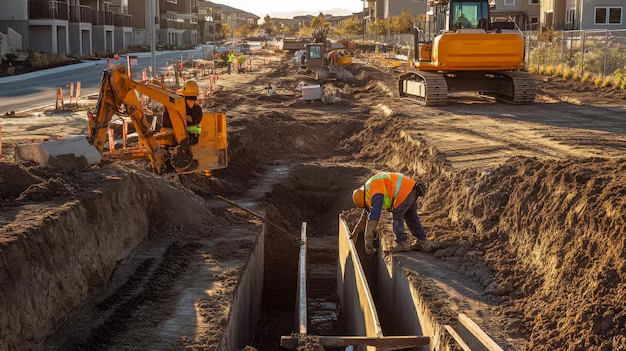The Opportunity in Front of Construction Companies
Across Arizona, Texas, and New Mexico, utility construction is booming. Transmission upgrades, substation expansions, renewable interconnections, and EV infrastructure are creating a wave of new projects that demand experienced builders.
For many construction companies, this looks like the next great opportunity. Utility work offers large, multi-year contracts, steady schedules, and long-term partnerships. Yet behind that promise sits a reality that catches new entrants off guard. The challenge is not the work itself. It is navigating the systems, compliance, and coordination that come with building inside a regulated environment.
Breaking into the utility market requires more than equipment and manpower. It takes discipline, structure, and precision at every level of execution.
Where Most Contractors Struggle
Contractors who have built schools, warehouses, or industrial facilities often find the transition to utility work harder than expected. The same project delivery principles apply, but the environment is far less forgiving.
Common pitfalls include:
-
Permitting and regulatory approvals that stall field progress before mobilization begins
-
Utility coordination where schedule alignment depends on outage windows and interconnection timing
-
Documentation requirements that go well beyond standard construction turnover
-
Design changes and scope gaps that are discovered late and lead to cost overruns
-
Communication breakdowns between field crews, owners, and utility representatives
Most of these issues are not technical. They are cultural. Utility work runs on planning, communication, and compliance. Teams that are used to moving fast and adjusting on the fly can find themselves slowed by layers of process.
The Culture Shift: From Builder to Partner
Success in utility construction starts with mindset. Contractors who thrive in this space learn to treat the utility not as a client but as a partner in execution. That partnership begins long before boots hit the ground.
MWC has seen that the best performing teams build structure early. They invest in clear documentation, track submittals, and communicate with precision. They understand that the utility’s schedule is not a suggestion. It is a critical path that determines every downstream activity.
Utility projects reward leadership that emphasizes accountability and process control. Every phase, from mobilization to energization, depends on the team’s ability to follow through consistently.
The Three Disciplines That Set Utility Builders Apart
1. Project Management
Strong project management ensures that scope, cost, and schedule align. In the utility world, it also means knowing how to plan around outages, regulatory milestones, and inspection checkpoints.
MWC supports construction teams by developing structured project plans, risk logs, and communication protocols that keep owners and contractors aligned from kickoff to closeout.
2. Construction Management
Field execution in utility projects requires coordination across multiple trades and stakeholders. Every tie-in, trench, and switchgear pad has dependencies that must be tracked.
Our construction management teams focus on field readiness, quality assurance, and daily coordination that eliminates idle time and confusion.
3. Scheduling and Controls
Utility projects live or die by their schedule. Managing those schedules means integrating procurement, submittal approvals, and utility work windows into one controlled plan.
MWC brings the discipline of critical path analysis, earned value tracking, and real-time reporting to keep projects predictable and profitable.
Building Trust Through Execution
Utilities remember partners who deliver without excuses. They also remember those who cannot meet expectations. That is why consistency matters more than scale. A smaller contractor with disciplined management and clean documentation can outperform a large firm that lacks coordination.
At MWC, we believe leadership is shown through reliability. Our teams operate with military precision—clear mission objectives, defined responsibilities, and accountability at every level. When problems arise, we do not wait for direction. We bring solutions and keep the schedule moving.
A Smarter Way to Enter the Utility Market
For construction firms exploring this space, the path forward is simple but not easy:
-
Invest in planning and documentation early
-
Develop leaders who can communicate across organizations
-
Treat compliance as part of the build, not an obstacle
-
Align with partners who understand both the field and the utility side
MWC exists to help construction companies make that transition successfully. We provide the structure, scheduling expertise, and project leadership that turn opportunity into performance.
Closing Thought
The future of infrastructure in the Southwest depends on collaboration between utilities and builders who can execute with precision. The projects coming to Arizona, Texas, and New Mexico will shape how communities grow and how the grid performs for decades to come.
At Mountain West Consulting, we are proud to help bridge the gap between construction execution and utility coordination. For firms ready to take that next step into the utility sector, success starts with disciplined planning and ends with dependable results.


Recent Comments